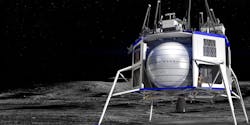Star Wars: Blue Origin Sues NASA Over SpaceX’s Lunar Lander Contract
Despite a failed appeal to the Government Accountability Office, Blue Origin is still protesting the National Aeronautics and Space Administration’s selection of SpaceX to construct the new lunar lander. Blue Origin, the private space company founded by Jeff Bezos, has sued NASA in the U.S. Court of Federal Claims for the allegedly unfair way in which it awarded the contract to just one company.
“We firmly believe that the issues identified in this procurement and its outcomes must be addressed to restore fairness, create competition, and ensure a safe return to the Moon,” Blue Origin’s lawsuit said. NASA confirmed in a statement they had received the lawsuit.
The contract for the landing system for the first manned voyage to the moon since the 70s was awarded in April to one of Blue Origin’s private-space-race rivals, SpaceX, helmed by Tesla CEO Elon Musk. A third company, Dynetics, also competed for the $2.9 billion contract.
Blue Origin protested the award with the Government Accountability Office, but their complaint was mostly thrown out as the GAO found NASA had not violated procurement law by only awarding the contract to one company.
In a statement, the GAO noted that, while NASA had stated a preference for awarding the contract to two companies, it was not bound to do so.
“After noting that SpaceX submitted the lowest-priced proposal with the highest rating, and that the offers submitted by Blue Origin and Dynetics were significantly higher in price, NASA also concluded that the agency lacked the necessary funding to make more than one award,” GAO said. “[NASA’S] announcement reserved the right to make multiple awards, a single award, or no award at all.”
In a late-July letter to NASA administrator Bill Nelson sent three weeks before the lawsuit was issued, Blue Origin CEO Jeff Bezos appealed to NASA’s preference for multiple contractors and tried to sweeten the pot.
“Instead of investing in two competing lunar landers as originally intended, [NASA] chose to confer a multi-year, multi-billion-dollar head start to SpaceX. That decision broke the mold of NASA’s successful commercial space programs by putting an end to meaningful competition for years to come,” wrote Bezos, and said depending solely on SpaceX was a risky decision.
Bezos, famously one of the richest people in the world, offered to have Blue Origin soak some of the costs of allowing it to compete, including accepting a fixed-cost contract for the work and waiving $2 billion worth of payment for the first two fiscal years of work.
“NASA veered from its original dual-source acquisition strategy due to perceived near-term budgetary issues, and this offer removes that obstacle,” Bezos wrote.
But NASA didn’t bite.
About the Author
Ryan Secard
Associate Editor
Ryan Secard joined Endeavor B2B in 2020 as a news editor for IndustryWeek. He currently contributes to IW, American Machinist, Foundry Management & Technology, and Plant Services on breaking manufacturing news, new products, plant openings and closures, and labor issues in manufacturing.
